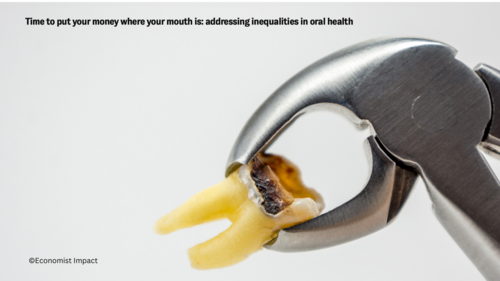
The status of caries and periodontitis in the UK presents a complex challenge linked to broader health, socioeconomic factors, and the accessibility of dental care. The recent Economist Impact white paper commissioned by the EFP, addresses the interconnected nature of caries and periodontitis, highlighting their prevalence globally and underscoring the need for an integrated approach to oral health.
According to the report, caries and severe periodontitis affect approximately 2 billion and 1 billion people worldwide, respectively, making them the most common oral diseases and surpassing the prevalence of other non-communicable diseases (NCDs).
The situation in the UK reflects global trends, with significant disparities in oral health and access to care. According to the white paper, the cost of caries in the UK population aged 12-65 years is over 17 billion US$, and more than 4 billion US$ for the most deprived quintile of the population.
The white paper also criticises the predominant "repair approach" in clinical care for dental caries, advocating for a shift towards preventive care and a reduction in the socioeconomic disparities in oral health. These inequalities should be tackled through both upstream and downstream preventive measures. At the population level, strategies such as community water fluoridation, sugar taxes, and oral health education programmes have shown effectiveness in reducing the burden of oral diseases. Individually, practices like brushing twice daily with fluoridated toothpaste and interdental cleaning can prevent or slow the progression of caries and periodontal diseases.
The UK introduced the Soft Drinks Industrial Levy for sugar-containing soft drinks in 2018. Around 45,000 tonnes of sugar have been removed from soft drinks after implementing the levy. An evaluation of the impact of the sugar tax in the UK was performed 22 months after its introduction. A 12.1% relative reduction in hospital admissions was seen among children aged 0-18 years after the introduction of the sugar tax, and the difference was seen regardless of deprivation status. The highest reductions were noted for children between 0-4 years at 28.6%, followed by 5-9 years at 5.5%. However, barriers to implementing these preventive measures persist.
The economic impact of caries is particularly highlighted in the report. Data on the direct costs of caries across different countries show a disproportionately high burden among the most deprived populations. In the UK, the per-person cost of caries was estimated to be the highest for the most deprived groups at 28,479 US$, and a levelling-up approach to preventive management is proposed to significantly reduce costs among this quintile.
« The numbers in this report reveal a stark contrast in oral health outcomes. In 2018, more than one-third of children in the most deprived groups in the UK had experienced caries, compared to just 14% of their least deprived counterparts. Moreover, the direct costs associated with caries in the UK's 12-65 age group are among the highest globally, estimated at $22,910 per person,” said Professor Philip Preshaw, president of the British Society of Periodontology and Implant Dentistry. “These figures are not just numbers, but a call to action. They highlight the urgent need for a multifaceted approach to oral health care in the UK, emphasising the importance of preventive measures, public awareness, and equitable access to dental services. »
Key recommendations from the report include expanding and diversifying the oral health workforce, incentivising preventive care, raising awareness among the population, and improving epidemiological methods for early detection and prevention of oral diseases. The white paper also calls for public-private partnerships and a transdisciplinary approach to address the commercial determinants of health, such as sugar consumption, which significantly contributes to oral health issues.
Preventive interventions would have greatest cost reductions for the most deprived. According to the report, the per person reduction in care costs in the most disadvantaged group could approach almost 17,728 US$ in the UK.
“It is imperative that we adopt strategies that not only address the symptoms of these diseases but also tackle their root causes, ensuring that every individual, regardless of their socioeconomic status, can achieve optimal oral health,” said Professor Nicola West, EFP secretary general. “Prioritising preventive oral health strategies will also reduce long-term health care costs. It is time for policy makers to ‘put their money where their mouth is’ as the white paper points out."





